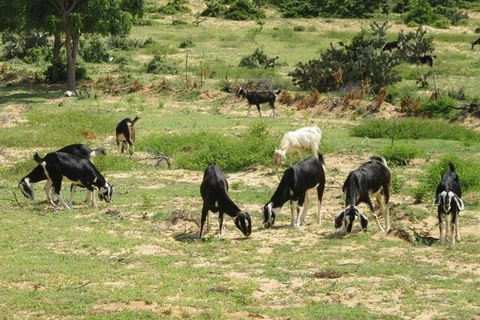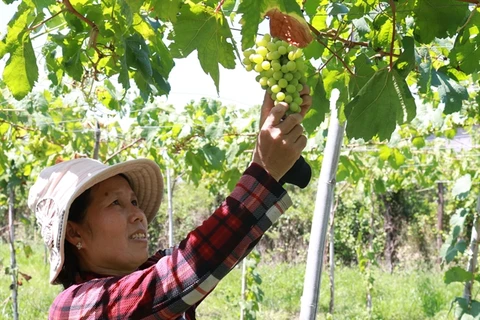Ninh Thuan (VNS/VNA) - Many reservoirs in the south-central province of Ninh Thuan are facing a shortage of water, affecting supply for the 2019-2020 winter-spring crop, animals and household use.
The province’s 21 main reservoirs now have a total of 88.2 million of cubic metres of water, equal to 45 percent of their total water storage capacity, according to the province’s Irrigation Works Exploitation One-Member Company.
Of the reservoirs, only the Song Sat reservoir in Bac Ai district has 52.4 million cubic metres of water in storage compared to its capacity of 69.3 million cubic metres, while more than 10 reservoirs have less than 1 million cubic metres of water each, and some reservoirs are facing depletion.
The quantity of water in the 21 main reservoirs can only supply irrigation water for some areas in the winter-spring crop, according to the company.
The water of the Song Sat reservoir will be given priority to supply households and animals.
The province, which has the least rainfall in the country, is expected to have very hot weather and no rain from now to February next year.
Phan Quang Thuu, Deputy Director of the provincial Department of Agriculture and Rural Development, said to ensure irrigation water from now to the end of the winter-spring crop, the department had warned localities to only grow crops in low-lying areas and in areas which have enough irrigation water.
The department consulted the provincial People’s Committee to adjust the farming area for the winter-spring crop to 20,000ha, including 11,000ha of rice.
Localities which face difficulty in securing irrigation water for farming should restructure crop cultivation to suit their situation, and save irrigation water for household use and animals, he said.
In Thuan Nam district, which has suffered more severe conditions than most other districts, six reservoirs contain a low level of water because of lack of sufficient rainfall this year.
Farmers in the district’s many areas have stopped growing crops on more than 800ha this year.
With the current situation, the district is expected to reduce the farming area of the winter-spring crop further because of a shortage of irrigation water.
Besides the province’s reservoirs, Don Duong Reservoir in neighbouring Lam Dong province also supplies water for irrigation and household use in many districts in Ninh Thuan.
The Don Duoơng Reservoir, which is managed by the Da Nhim – Ham Thuan – Da Mi Hydro Power Joint Stock Company in Lam Dong province, now has 139.2 million cubic metres of water compared to its capacity of 165 million cubic metres.
Luu Xuan Vinh, Chairman of the provincial People’s Committee, has asked the department and the province’s Irrigation Works Exploitation One-Member Company to work with the Da Nhim – Ham Thuan – Da Mi Hydro Power Joint Stock Company to set up a plan to supply irrigation water for the winter-spring crop in Ninh Thuan.
The province would not supply irrigation water for crops in unzoned farming areas and areas that do not restructure crop cultivation, he said.
The provincial People’s Committee targets restructuring 1,500ha of dry crop cultivation to cope with climate change this year. Localities have restructured 1,371ha of 1,500ha so far this year./.
The province’s 21 main reservoirs now have a total of 88.2 million of cubic metres of water, equal to 45 percent of their total water storage capacity, according to the province’s Irrigation Works Exploitation One-Member Company.
Of the reservoirs, only the Song Sat reservoir in Bac Ai district has 52.4 million cubic metres of water in storage compared to its capacity of 69.3 million cubic metres, while more than 10 reservoirs have less than 1 million cubic metres of water each, and some reservoirs are facing depletion.
The quantity of water in the 21 main reservoirs can only supply irrigation water for some areas in the winter-spring crop, according to the company.
The water of the Song Sat reservoir will be given priority to supply households and animals.
The province, which has the least rainfall in the country, is expected to have very hot weather and no rain from now to February next year.
Phan Quang Thuu, Deputy Director of the provincial Department of Agriculture and Rural Development, said to ensure irrigation water from now to the end of the winter-spring crop, the department had warned localities to only grow crops in low-lying areas and in areas which have enough irrigation water.
The department consulted the provincial People’s Committee to adjust the farming area for the winter-spring crop to 20,000ha, including 11,000ha of rice.
Localities which face difficulty in securing irrigation water for farming should restructure crop cultivation to suit their situation, and save irrigation water for household use and animals, he said.
In Thuan Nam district, which has suffered more severe conditions than most other districts, six reservoirs contain a low level of water because of lack of sufficient rainfall this year.
Farmers in the district’s many areas have stopped growing crops on more than 800ha this year.
With the current situation, the district is expected to reduce the farming area of the winter-spring crop further because of a shortage of irrigation water.
Besides the province’s reservoirs, Don Duong Reservoir in neighbouring Lam Dong province also supplies water for irrigation and household use in many districts in Ninh Thuan.
The Don Duoơng Reservoir, which is managed by the Da Nhim – Ham Thuan – Da Mi Hydro Power Joint Stock Company in Lam Dong province, now has 139.2 million cubic metres of water compared to its capacity of 165 million cubic metres.
Luu Xuan Vinh, Chairman of the provincial People’s Committee, has asked the department and the province’s Irrigation Works Exploitation One-Member Company to work with the Da Nhim – Ham Thuan – Da Mi Hydro Power Joint Stock Company to set up a plan to supply irrigation water for the winter-spring crop in Ninh Thuan.
The province would not supply irrigation water for crops in unzoned farming areas and areas that do not restructure crop cultivation, he said.
The provincial People’s Committee targets restructuring 1,500ha of dry crop cultivation to cope with climate change this year. Localities have restructured 1,371ha of 1,500ha so far this year./.
VNA
























